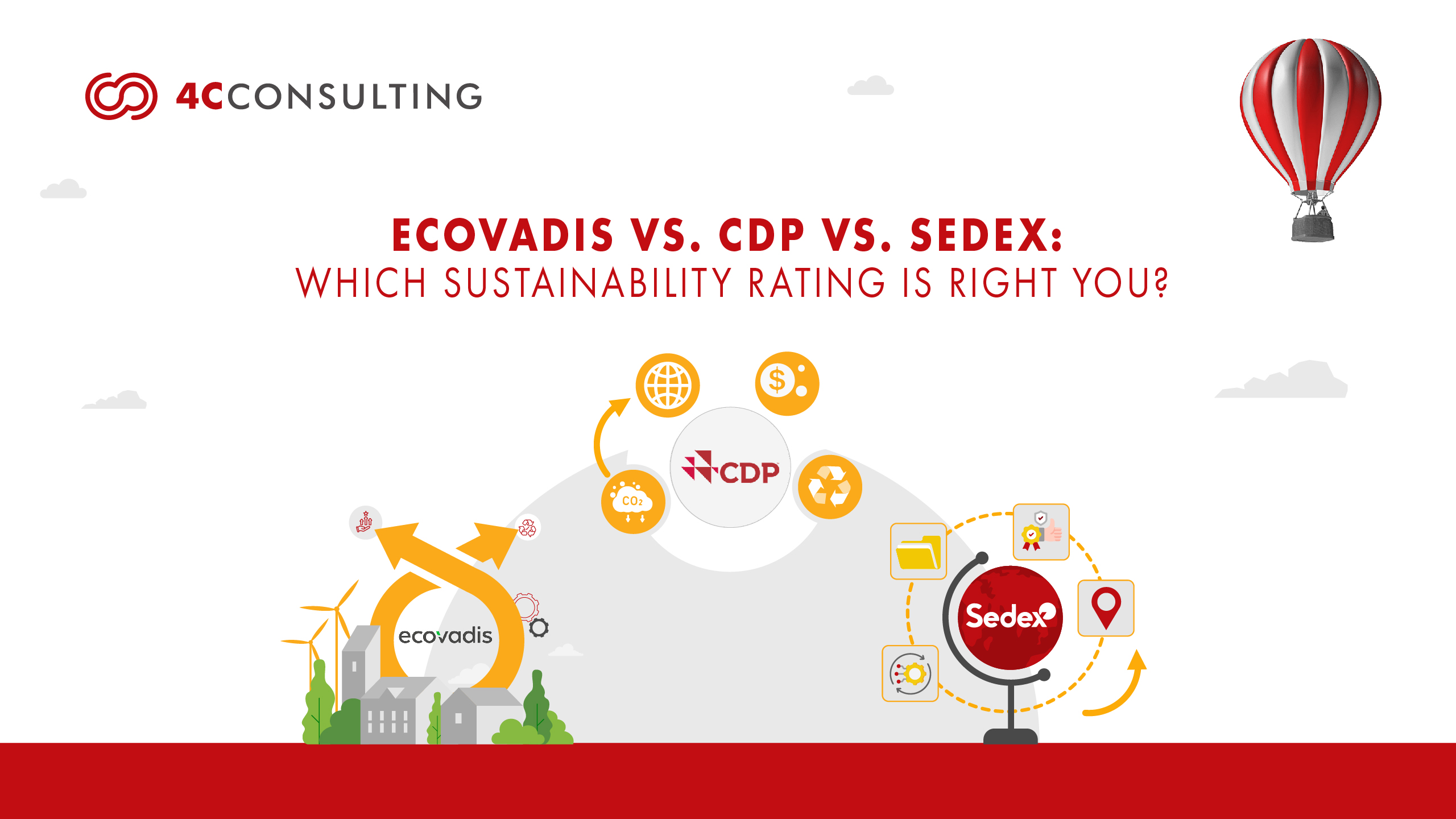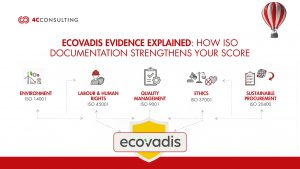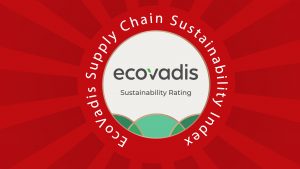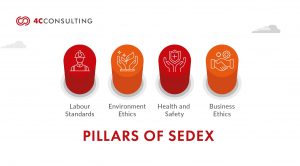Ecovadis Vs. CDP Vs. SEDEX Which Supplier Sustainability Reporting System is Right For You?
29th Sep, 2025Global supply chains are under increasing pressure to demonstrate transparency, ethical practices and environmental responsibility. Investors, regulators and multinational clients are demanding verifiable data on how companies manage sustainability. To meet these expectations organizations, turn to sustainability rating systems that assess, benchmark and report performance.
Three of the most widely used systems for supplier responsibility and sustainability are EcoVadis, CDP (Carbon Disclosure Project) and Sedex (Supplier Ethical Data Exchange). While EcoVadis and CDP provide sustainability ratings and environmental disclosures, Sedex serves as a supplier data-sharing platform that focuses on labor practices, human rights and ethical trade within global supply chains.
Many companies struggle to decide which system aligns best with their industry, client demands and long-term ESG goals. Choosing incorrectly can mean wasted resources, compliance gaps or missed business opportunities.
In this guide, we provide a clear comparison of EcoVadis, CDP and Sedex highlight their strengths and share practical insights to help you select the best sustainability rating framework for your business.

.
What Are EcoVadis, CDP and Sedex?
EcoVadis is a global sustainability rating platform that evaluates suppliers on 21 CSR criteria across environment, labor & human rights, ethics and sustainable procurement. It provides companies with a scorecard-based assessment to benchmark supplier performance and improve transparency across supply chains.
CDP (Carbon Disclosure Project):
CDP is an international non-profit that runs the world’s leading disclosure system for climate change, water security and deforestation. Companies, cities and investors use CDP to report environmental performance, enabling stakeholders to understand risks, emissions and long-term sustainability strategies.
Sedex (Supplier Ethical Data Exchange):
Sedex is a collaborative platform that enables organizations to manage and share information on ethical trade, labor standards and supply chain compliance. It is widely used with the SMETA audit methodology to ensure responsible sourcing, worker safety and social accountability in supplier networks.
.
.
EcoVadis vs. CDP vs. Sedex: Strategic Comparison for Supplier Sustainability
EcoVadis vs. CDP vs. Sedex Sustainability Comparison |
| Criteria | EcoVadis | CDP | Sedex |
| Objective | ESG supplier rating & benchmarking | Environmental disclosure for climate, water, forests | Ethical trade & social compliance management |
| Assessment Method | Questionnaire + evidence review (21 CSR criteria) | Annual disclosure questionnaires (A–D score) | SAQ + SMETA audit (2/4 pillars) |
| Primary Coverage | Environment, Labor & Human Rights, Ethics, Procurement | Climate change, carbon, water, deforestation | Labor rights, health & safety, business ethics |
| Recognition & Use | Accepted by 125k+ companies, strong in procurement | Trusted by 740+ investors & regulators | 75k+ members; strong in FMCG, apparel, agriculture & more |
| Badges / Recognition | EcoVadis Medals (Platinum, Gold, Silver, Bronze) | Leadership bands (A score) signal global recognition | SMETA audit report acceptance across industries |
| Deliverables | Scorecard (0–100), benchmarks, corrective actions | Climate/environmental disclosure reports | Audit reports, risk dashboards & supplier profiles |
| Audit / Verification | Analyst-validated, evidence-based | Disclosure checked & benchmarked | On-site third-party SMETA audits |
| Reporting Frequency | Annual (with score updates) | Annual (strict deadlines) | 1–2 years (audit-driven) |
| Regulatory Alignment | Supports EU CSRD, German Supply Chain Law | Directly supports TCFD, CSRD, SEC reporting | Aligns with ETI Base Code, UNGP, ILO standards |
| Confidentiality | Scorecards shared with permission; partly private | Disclosures often public and investor-facing | Supplier data private; shared selectively with buyers |
| Comparability | Benchmarkable across industries & peers | High comparability on emissions & climate data | Limited & focused on labor/ethical audits |
| Improvement Mechanism | Corrective Action Plan (CAP) for suppliers | Transparency & disclosure improvement guidance | Audit findings drive remediation & corrective actions |
| Effort for Suppliers | Evidence documentation needed | Resource intensive reporting | Audit preparation & follow-up |
| Integration Options | Procurement platforms (SAP Ariba, Coupa) | ESG & investor reporting systems | Shared buyer supplier data platform |
| Industry Relevance | Cross-industry (manufacturing, pharma, services) | Capital markets, heavy emitters, listed companies | Labor-intensive sectors (retail, FMCG, textiles & agriculture) |
| Geographic Reach | Global 175+ countries | Global strongly in EU, US & APAC | Strong in Europe, Asia, emerging markets |
| Strategic Value | Enables supplier ESG benchmarking & supply chain improvement | Provides credible climate data for investors & regulators | Strengthens ethical sourcing & labor compliance visibility |
.
How To Choose The Right Supplier Sustainability System For Your Business
Different sustainability systems serve different business needs. Some focus on procurement approvals, others on investor disclosures and some on ethical trade in labour intensive industries. The choice depends on who your stakeholders are and what type of data or assurance they require. The following points outline the main factors companies consider when deciding between EcoVadis, CDP or Sedex:
- Procurement-Driven Supplier Approval: Global buyers increasingly demand sustainability ratings as a prerequisite for onboarding. Instead of answering multiple client-specific questionnaires, suppliers can present a universally accepted scorecard that demonstrates maturity across environment, labor, ethics and procurement practices. A mid-sized packaging company expanding into European FMCG supply chains secures faster acceptance by leveraging EcoVadis.
- Investor Driven Environmental Disclosure: Organizations accountable to shareholders and regulators must disclose accurate, comparable data on climate performance. Beyond compliance, such disclosures influence access to capital and investor trust. For instance, a power utility aligning with TCFD and CSRD requirements provides credible emissions and risk data through CDP.
- Ethical Trade in Labor-Intensive Sectors: Industries dependent on large workforces are closely monitored for working conditions, human rights and fair-trade practices. To satisfy global retailers and brand owners, suppliers require an auditable framework that verifies compliance across sites. A textile exporter demonstrating worker safety and ethical sourcing practices meets buyer expectations through Sedex.
- Consolidating Multiple Assessments: Many suppliers face repetitive sustainability checks from different clients, leading to wasted resources and inconsistent results. A single standardized evaluation, validated and recognized across industries, eliminates duplication and strengthens comparability. A pharmaceutical manufacturer catering to diverse international buyers meets all requirements efficiently with EcoVadis.
- Regulatory and Financing Requirements: Climate-intensive sectors face growing pressure to evidence carbon reduction strategies in order to access financing or comply with disclosure directives. Lenders and regulators expect structured, verifiable data on environmental impact. A chemical producer preparing to issue green bonds provides this assurance through CDP.
- Visibility Across Extended Supply Chains: Retailers and consumer brands with multi-tier supply networks require oversight far beyond direct suppliers. A collaborative platform allows them to identify risks, track performance and ensure alignment with ethical trade standards. A global food company monitoring agricultural sourcing partners achieves this oversight through Sedex.
.
KEY BENEFITS OF USING SUPPLIER SUSTAINABILITY SYSTEMS
- Stronger Market Access: Global buyers increasingly make sustainability ratings a prerequisite for supplier onboarding. Having EcoVadis, CDP or Sedex recognition reduces entry barriers and helps suppliers secure contracts faster. This shortens approval cycles and opens access to international markets where such credentials are mandatory.
- Improved Stakeholder Trust: Investors, regulators and customers expect credible data on sustainability performance. Verified disclosures and audit-backed frameworks demonstrate accountability, strengthening trust with stakeholders. This transparency directly supports brand reputation and long-term business stability.
- Operational Efficiency: Suppliers often face overlapping audits and repetitive client questionnaires. A standardized framework consolidates these requirements into a single process, reducing time, cost and duplication. This efficiency allows organizations to redirect resources toward improvement initiatives instead of administration.
- Risk Management & Transparency: Sustainability systems help identify risks in labor conditions, procurement practices or climate reporting before they escalate. Proactive monitoring improves visibility across supply chains and enables corrective actions early. This reduces the chance of compliance failures, reputational damage or supply disruptions.
- Competitive Advantage: Companies that demonstrate sustainability maturity stand out in crowded markets. Recognized ratings provide clear proof of ethical and environmental performance, making it easier to win bids and long-term contracts. Over time, this leadership strengthens positioning against less transparent competitors.
- Alignment With Regulations & Financing: Disclosure frameworks like CDP and EcoVadis support compliance with EU CSRD, TCFD and similar laws. Verified data also unlocks financing opportunities such as green bonds or sustainability-linked loans. Businesses gain both regulatory assurance and access to capital.
Choosing between EcoVadis, CDP and Sedex ultimately comes down to your business priorities whether that is procurement-driven approvals, investor-focused climate disclosure or ethical trade oversight in labour-intensive sectors. EcoVadis provides cross-industry ESG benchmarking, CDP strengthens environmental reporting for regulators and investors and Sedex ensures visibility on labor and social compliance. By aligning the right framework with your industry, stakeholder demands and long-term ESG goals; companies can not only stay compliant but also build trust, efficiency and competitive advantage in global markets.
.
HOW 4C CONSULTING HELP ORGANIZATION CHOOSE IS RIGHT SUPPLIER SUSTAINABILITY REPORTING SYSTEM FOR YOU?
At 4C Consulting, we simplify the process of selecting and implementing the right sustainability reporting system for your business. With 15+ years of ESG and compliance expertise, 10,000+ consulting hours and multi-industry experience, our specialists guide you in identifying whether EcoVadis, CDP or Sedex best meets your client, regulatory and investor requirements. From gap assessments and documentation support to training, audit readiness and corrective action planning, we provide end-to-end assistance that ensures smooth adoption. Partnering with 4C means fewer compliance risks, faster buyer acceptance and a stronger reputation for transparency and responsibility across your supply chain. Book your free Sustainability Gap Assessment with 4C today.
Frequently Asked Questions:
EcoVadis provides ESG supplier ratings and benchmarking, CDP focuses on environmental disclosure for investors and regulators and Sedex manages ethical trade and labor compliance through SMETA audits.
EcoVadis is not mandatory by law, but many multinational buyers make it a prerequisite for supplier approval. Having an EcoVadis scorecard often accelerates procurement acceptance.
Companies disclose through CDP to provide credible data on climate risks, carbon emissions, water usage and deforestation. It helps meet investor expectations, comply with frameworks like TCFD and CSRD and access sustainable financing.
Sedex is widely used in labour-intensive industries such as textiles, FMCG, agriculture and retail, where ethical sourcing, worker safety and social accountability are closely monitored.







